|
When Elaine R. Harris worked her stones with
chisel and mallet, an amazing transformation took place. Marble,
alabaster, serpentine and soapstone were turned into almost translucent
sculptures, with a surface as smooth as velvet.
Elaine developed her own unique style. She prefered to sculpture
animals - especially birds, fish and insects - but they are all
her own special interpretation. It was time consuming and hard work.
She never used power tools.
Elaine was a hairdresser by trade. She was in her early 50's when
she started painting. A few years later she attended classes at
the University of Maine to learn stone sculpting. Over the years
she created an impressive collection of sculptures - unlike any
others. Many of her sculptures were done at her camp at Pushaw Lake
in beautiful Maine, USA.
|
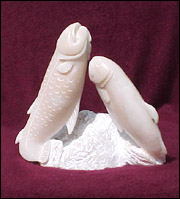
Jumping fish - alabaster
|
Click the pictures for a larger version.
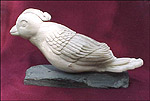
Bird - alabaster
|
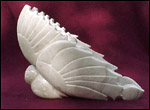
Butterfly - alabaster
|

Fish - alabaster
|
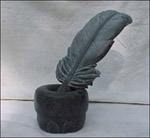
Quill pen - soapstone
|

Grapes - serpentine
|

Fish - serpentine
|
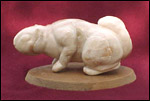
Squirrel - alabaster
|
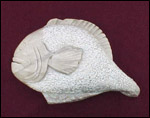
Fish - alabaster |
Alabaster
- fine-grained, massive gypsum (hydrated calcium sulfate) that
has been used for centuries for statuary, carvings, and other ornaments.
It normally is snow-white and translucent but can be artificially dyed;
it may be made opaque and similar in appearance to marble by heat treatment.
Marble
- granular limestone or dolomite (i.e., rock composed of calcium-magnesium
carbonate) that has been recrystallized under the influence of heat, pressure,
and aqueous solutions. Commercially, it includes all decorative calcium-rich
rocks that can be polished, as well as certain serpentines.
Serpentine
- any of a group of hydrous magnesium-rich silicate minerals. Serpentine
is usually grayish, white, or green but may also be yellow or green-blue.
Serpentine characteristically occurs along the crests and axes of great
folds, such as island arcs or Alpine mountain chains.
Soapstone
- is more correctly talc - a common silicate mineral that is distinguished
from almost all other minerals by its extreme softness. Its soapy or greasy
feel accounts for the name soapstone given to compact aggregates of talc
and other rock-forming minerals.
(Source: Encyclopędia Britannica)

Elaine Harris was invited to show her sculptures at Fleet Bank in
Old Town, Maine in 2001.
|
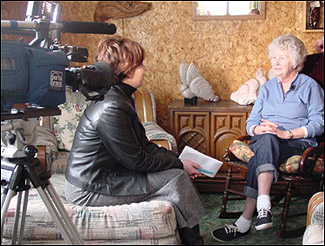
Elaine during an interview with TV5 News.
|
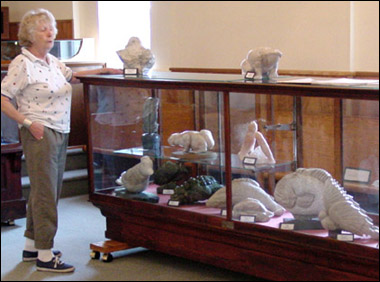
Here Elaine is working on an exhibition at Old Town Museum..
|
This is a selection of Elaines paintings
Click the pictures for a larger version.
|

